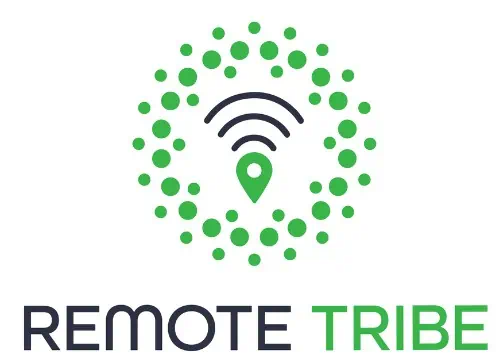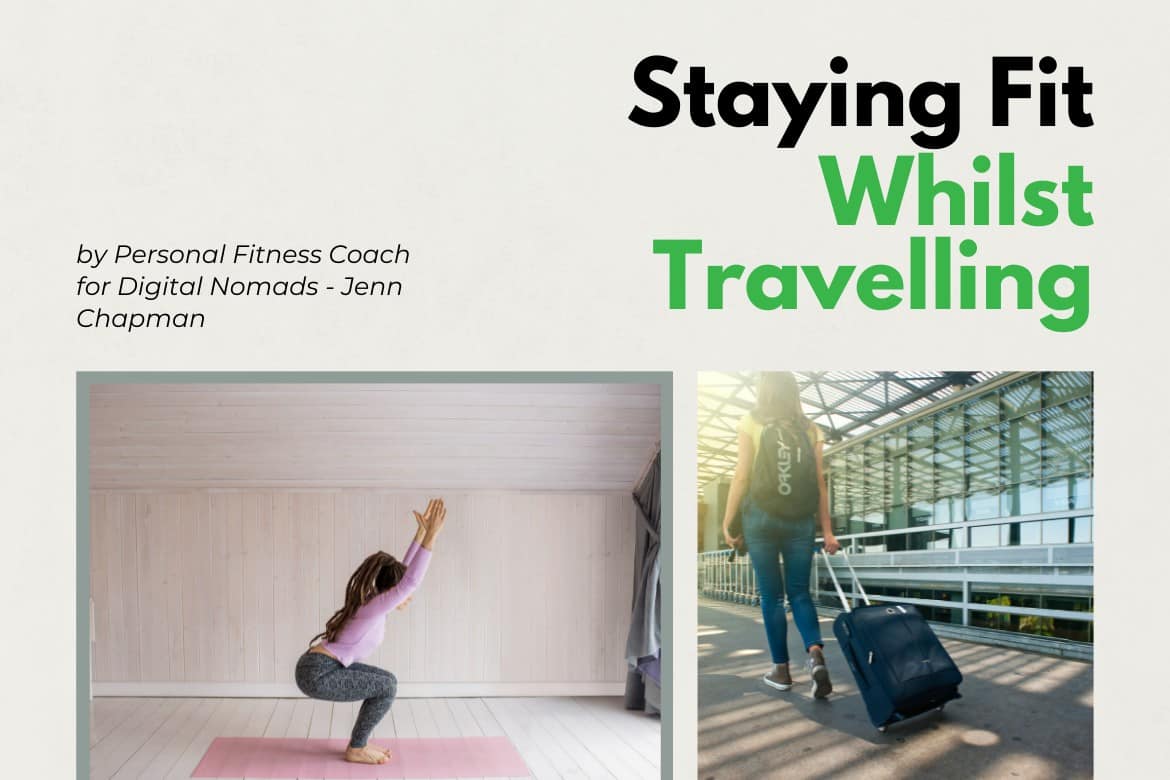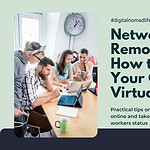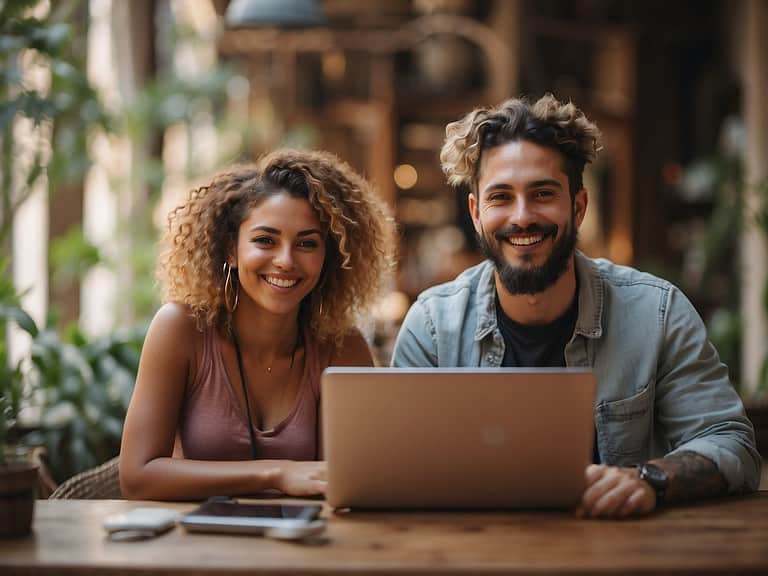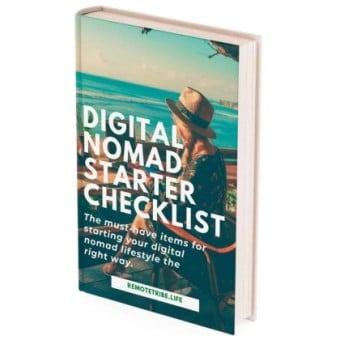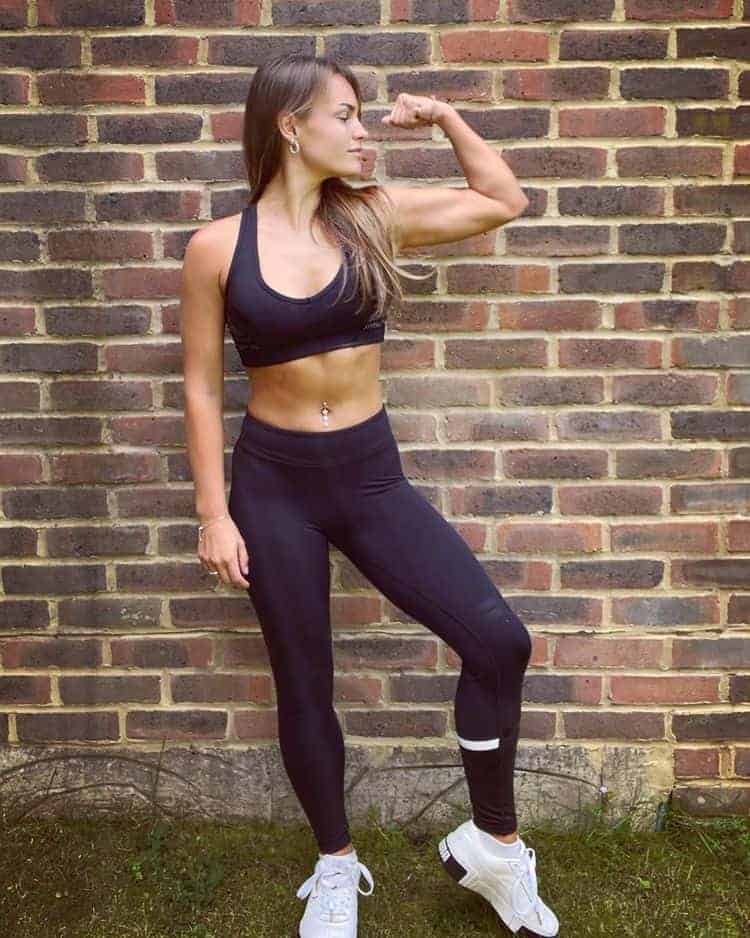
Jenn Chapman
A full time digital nomad and the Founder of The Fit Nomad programs. Alongside her career as a London Financial Adviser, Jenn has also been involved in the health and fitness industry since early 2017; starting out helping hundreds of girls around the world transform their body from the comfort of home using the Sweat with Jenn free-weight & bodyweight programs.
Being a digital nomad is, of course, amazing – we get to experience different parts of the world, new cultures, new foods, meet new people etc – but this lifestyle can regularly come at the cost of our health and fitness.
Many digital nomads report feeling a little ‘fluffier’ and overall a little less healthy than when they set out, but feel lost in knowing how to stay fit when travelling and balancing being fully present to experience the benefits of this lifestyle without losing their confidence and health in the process.
There’s no denying that this can be a challenge – in general we want to try all the amazing new foods, drink cocktails on the beach, rarely workout and magically maintain health, right!?
It might seem impossible, but don’t be disheartened – you can have your cake and eat it! When you know how to take care of your body and self in any environment you achieve the real freedom that you went looking for when you quit the 9-5 and jumped on a plane.
Afterall, what’s the point in living life from your dream location if you don’t have the confidence to stand in your swimwear or the energy and endurance to climb the nearby volcano?
There are small things you can do every day that will make a big difference to your overall well-being, and ultimately the end experience of your time as a nomad (if there is an end).
We’ve put together a list of little tips and tricks that you can start using today to help you stay fit whilst travelling.
Drink Water
This one may sound simple and obvious – but hardly anyone does it! Water is essential for many processes in the body, including digestion and the removal of toxins and fat.
Typically nomads choose a warm climate to work from, this means you’re probably sweating much more than you used to. You need to replace the water you’re losing through the additional sweat. We also tend to drink alcohol a little more frequently in this lifestyle – we’re on the beach or in the mountains, so why not!?
If you’re suffering from headaches, dry skin, bloating or constipation though these (among many other symptoms) can all be signs you aren’t drinking enough water and are dehydrated.
Men should aim to drink upwards of 3L of water a day and women between 2.5-3L.
MOVE!
It’s very easy to get trapped in a sedentary lifestyle as a nomad. We sit at our laptops, we sit on the beach or by the pool, we sit at a cafe or a bar.. We do a lot of sitting! Sure there’s a few mountain hikes or snorkeling trips thrown in there, but in general we can end up doing a whole lot of sitting!
Your body needs to move, that’s what it was designed to do! Setting a step goal and setting reminders to stick to it can help you increase your energy output every day. Aiming for 8,000 – 10,000 steps is a great goal, and you only need your phone or watch to track so it’s easy to maintain.
Taking regular breaks from the laptop to get a few steps in isn’t only good for your step count, but also for your eyes, back and posture!
Bodyweight Workouts
How to workout while travelling is one of the most common questions of a nomad. We (likely) don’t have regular access to a gym and there’s no one around to push us to work out, so what do you do?
Lots of people discount bodyweight workouts, thinking it’s ‘a waste of time’ if they don’t have a dumbbell to throw around. This simply is not true at all!
Bodyweight workouts can be very effective if you know what you’re doing. It’s true that you’re unlikely to build a whole load of new muscle mass & strength, but you can most definitely maintain your muscle mass and effectively burn fat.
Try to make time for at least 3 bodyweight resistance sessions a week, they don’t need to last forever, 30 minutes is sufficient.
The great thing about bodyweight training is that it requires no equipment, so you have no excuses – you can get your training done no matter where you are!
Routine
I’m sure lots of nomads left the 9-5 rat race to give up all forms of a routine, working whenever you want and playing whenever you want.
Humans, in general, don’t actually work that well without any kind of routine though, and putting a loose routine in place can definitely help in your quest to stay fit while travelling.
Choosing a time to get your workout and your steps in means you are much more likely to stick to it, and means you can choose the time of day that will suit you best. If you’re a morning person then scheduling your workout for Monday, Wednesday and Friday mornings first thing will probably work great for you. If you tend to finally make it up around 11am then perhaps a 5pm workout would suit you better!
Leaving these things to chance usually means we don’t end up finding the time to do them, but having a dedicated time significantly increases the chances.
Diet
Perhaps the hardest of all aspects to manage effectively is your diet – no one wants to be travelling the world and restricted to a diet!
The good thing is you don’t need to be following a strict regime to make healthy choices. If you have your own kitchen to prep food in then this will be much easier for you to manage as you can determine what goes in your food – if you’re staying in an AirBnB, co-working villa or hostel you typically have access to a kitchen and we recommend cooking at least one of your meals a day to retain an aspect of control. If you’re eating out 24/7 then this will take a little more thought as meals tend to come in at much higher calories and with far more unnecessary additives
Sugar
In many countries around the world – typically the ones digital nomads like to hang out in such as South East Asia, Mexico and Central America, sugar is a huge part of their diet and it is added to almost everything.
A simple fresh fruit smoothie is never left at just that unless you specify that you don’t want the heaped tablespoons of sugar that they like to add – it may taste great but did you really need the additional hundreds of calories in sugar? Traditional milk tea drinks all over Asia are also typically loaded with sugar, so a couple of Thai teas a day will leave you with a seriously high sugar intake.
Sugar is also commonly added to sauces for main dishes to improve the taste, particularly mass produced sauces such as Heinz Ketchup, but homemade sauces are sometimes no better. If you can, opt to have the sauce on the side of the meal so that you can determine how much you use. It’s best to limit total sugar intake to between 25-40g per day.
Salt
Another additive that is very common all over the world, not just in the more ‘rustic’ of places, is salt. Salt is added to dishes to improve the flavor or to preserve things for longer but too much sodium is bad for the body and causes things such as high blood pressure and many other organ diseases, so you really want to minimise your intake to around 1 teaspoon total per day.
This can be very hard to control when eating out as it’s not clear what has gone into the dish. Choosing foods such as grilled meats with vegetables which is common all over the world will minimise the chances of sodium having been added.
5 Colours
You’ve probably heard the term ‘eat the rainbow’ at some point but perhaps don’t fully understand what this means or why people say it.
Fruits and vegetables of different colours contain different micronutrients – these are the nutrients that our body needs in small amounts each day to keep the internal systems functioning well such as digestion, absorption of other nutrients, our skin, hair & nail quality and much more – almost everything in fact!. Micros include things such as calcium, iron, zinc and all the vitamins (A, B complex, C, D etc).
You primarily get these micros from fruits, veg and meat so it’s important that you’re eating a variety of colours to ensure you’re getting a variety of micros.
A good rule of thumb to aim for is eating 5 different colours a day. This could be for example 1 banana, 1 orange, 1 green bell pepper, some mushrooms and some eggplant over the course of a day and this would reduce the chances of deficiency in any one micronutrient.
If you’re cooking your meals yourself then adding in colour variety should be pretty easy, fresh fruits and vegetables are readily available in most parts of the world and changing up your meats regularly to include poultry, red meat and fish will also expand your intake of micros. If you’re eating out you’ll need to be a little more mindful of what you’re ordering at each meal but choosing vegetables as a side dish over the french fries and a vegetable omelette for breakfast would be a great start!
Summary
If you’re serious about this nomadic lifestyle and making it work for any substantial length of time then your health and wellbeing should be up there with your top priorities.
Maintaining your health doesn’t need to take up a lot of your time and efforts, small changes can go a long way and save you from heading home with digestion issues, poor skin and hair quality and a serious lack of confidence.
We know that implementing the above mentioned changes and techniques when no one is holding you accountable can be a challenge. We lose motivation quickly, particularly when we don’t know which direction to move in, so finding that necessary accountability and knowledge is key to our success.
You only have one body, so do your best to look after it and it will continue looking after you.

Jenn Chapman
Throughout her travels, Jenn realised she was being asked ‘how to exercise while travelling’ or ‘how to stay fit while travelling’ on a very frequent basis and found that there is really no support for people living this remote working lifestyle when it comes to this topic. 18 months after setting out in the nomad life herself, The Fit Nomad program was born! Jenn and her team of qualified personal trainers help digital nomads to navigate the unique challenges that this lifestyle presents with bespoke and very personalised coaching programs in order to regain and elevate their health and fitness and achieve the total freedom that they set out looking for. You can reach Jenn at www.thenomad-life.com or on instagram at @jennac.93.
